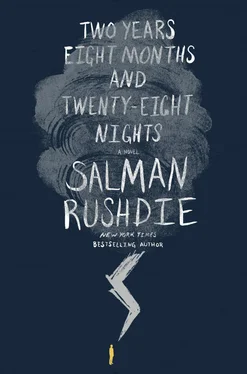Yes, he could, he could close his eyes and imagine their tiny figures descending onto the restored lawns of the repaired property, and then there she was, running towards him, embracing him, and Oliver Oldcastle who had once threatened his life now standing hat in hand with head bowed in gratitude and not protesting at all as the Lady Philosopher covered Mr. Geronimo’s face in kisses. Much obliged, Oldcastle mumbled. Damned if I know how you did it, but still. Very much obliged.
And this, all of this, Alexandra cried, whirling about and about. You’re a wonder worker, Geronimo Manezes, that’s what you are.
If he had given in to his jinn self he would have made love to her on the spot, right there on the magically renewed grass with Oliver Oldcastle watching, and yes, the desire was in him all right, but he had sworn himself to a cause, he was in the service of Dunia the new jinnia Queen of the Mountain and his human part insisted he remember his oath; before life, his life, human life, could be properly renewed, her banner had to be planted in triumph on the battlefield.
I have to go, he said, and Alexandra Bliss Fariña’s disappointed pout was the perfect opposite of Oliver Oldcastle’s grumpy grin of joy.
In the faraway country of A. there once lived a gentle king known to all his subjects as the Father of the Nation. He was progressively inclined, so he helped to bring his country into the modern age, introducing free elections, defending women’s rights, and building a university. He was not a rich king, and made ends meet by allowing half his palace to be used as a hotel, where he often took tea with the guests. He endeared himself to the young people of his own country and of the West by permitting the legal manufacture and sale of hashish, quality controlled and stamped with government seals of approval, gold, silver and bronze, denoting grades of purity and price. Those were good years, the years of the king, innocent years, perhaps, but sadly his health was poor; his back hurt and his eyes were weak. He traveled to Italy to undergo surgery but while he was away his former prime minister performed some surgery of his own, cut the king away from the state and took over the kingdom himself. In the next three decades while the king was in exile, contenting himself, as was his way, with the quiet pursuits of chess, golf and gardening, all hell broke loose in his former kingdom. The prime minister didn’t last long, and a period of tribal faction fighting followed, which made at least one of A.’s powerful neighbors think the country was ripe for the picking.
So there was a foreign invasion. This was a mistake foreigners repeatedly made — the attempted conquest of the land of A. — but they invariably left with their tails between their legs, or just lay dead on the battlefield for the benefit of scavenging wild dogs, who weren’t choosy about what they ate and were willing to digest even this type of horrible foreign food. But when the foreign invasion was repelled what replaced it was even worse, a murderous gang of ignoramuses who called themselves the Swots, as if the mere word would earn them the status of true scholars. What the Swots had studied deeply was the art of forbidding things, and in a very short time they had forbidden painting, sculpture, music, theater, film, journalism, hashish, voting, elections, individualism, disagreement, pleasure, happiness, pool tables, clean-shaven chins (on men), women’s faces, women’s bodies, women’s education, women’s sports, women’s rights. They would have liked to have forbidden women altogether but even they could see that that was not entirely feasible, so they contented themselves with making women’s lives as unpleasant as possible. When Zumurrud the Great visited the land of A. in the early days of the War of the Worlds, he saw at once that it was an ideal place to set up a base. It is an interesting and little-known detail that Zumurrud the Great was an aficionado of golden-age science fiction, and could have discussed with friends, if he had had any friends, the work of such masters of the genre as Simak, Blish, Henderson, Van Vogt, Pohl and Kornbluth, Lem, Bester, Zelazny, Clarke, and L. Sprague de Camp. Among his favorites was Isaac Asimov’s classic novel of the 1950s, Foundation, and he decided to name his operation in A. after that novel. “The Foundation” he set up and ran — originally with the assistance of Zabardast the Sorcerer, but, after their quarrel, by himself — quickly acquired a foothold in A. by the simple procedure of purchasing the country’s new rulers.
“I bought the country,” he boasted to his followers. “It’s ours now.”
It didn’t take much. The underground jewel caves of Zumurrud the Great are celebrated in the lore of the jinn. Perhaps, and we believe this to be probable, at least one of these caverns was situated in the harsh mountainous eastern borderlands of A., deep below the mountains, hidden from human eyes by gates of stone. When Zumurrud presented himself to the leadership of the Swots they were overawed by his gigantic size, made witless with fear by being in the presence of a fire-born jinni — but they were also driven mad with desire by the golden bowls of diamonds and emeralds he bore, casually, as if they were nothing, one bowl in each immense hand. Diamonds larger than the Kohinoor fell from the bowls and rolled along the floor, coming to rest at the Swots’ trembling feet. “You can have as many of these little trinkets as you want,” said Zumurrud in his giant’s voice, “and you can do what you like with this godforsaken land, you can ban the wind, for all I care, you can forbid the clouds to rain or the sun to shine, go right ahead. But from now on the Foundation owns you, Swots, so you had better swot up how to keep me happy. If not, then bad things can happen, such as this.” He snapped his fingers and one of the Swots, a skinny, bent fellow with rotten teeth and a deep hatred of dance music, was transformed instantly into a pile of smoldering ash. “Just a demonstration,” murmured Zumurrud the Great, setting down the bowls of jewels. And that was that.
While Dunia and Mr. Geronimo were away in Fairyland the Zumurrud group launched a series of such “demonstrations,” albeit on a larger scale, designed to cow the human race and bring it meekly to heel. We say “the Zumurrud group” because, as has previously been mentioned, the Grand Ifrit himself was a person of considerable natural indolence, who preferred to let others do the dirty work while he reclined in an arbor, drinking, eating grapes, watching pornography on TV, and being serviced by his personal cohort of jinnia females. He had brought down a small army of lesser jinn from the upper world and mostly pointed them in the directions he desired, and off they went, assassinating prominent individuals, sinking ships, bringing down airliners, interfering with the computer operations of the stock markets, cursing some people with the rising curse, others with the crushing curse, and using the jewels he had in such quantities to bribe governments and bring other countries into his sphere of influence. However, the total number of fully fledged dark jinn who descended to the lower world almost certainly never exceeded one hundred individuals, to which the lesser species of parasite-jinni must be added. So, perhaps two or three hundred conquerors, on a planet of seven billion souls. At the height of the British Empire in India, there were no more than twenty thousand Britishers in that vast land, ruling successfully over three hundred million Indians, but even that impressive achievement was as nothing when compared with the rise of the dark jinn. The Grand Ifrits were in no doubt that the jinn were superior to the human race in every way, that human beings for all their pretensions of civilization and advancement were little better than bow-and-arrow primitives, and that the best thing that could happen to these lowlifes would be to spend a millennium or two in thrall to, and learning from, a superior race. This, Zabardast went so far as to say, was the burden the dark jinn had taken upon themselves, a duty which they were determined to discharge.
Читать дальше












